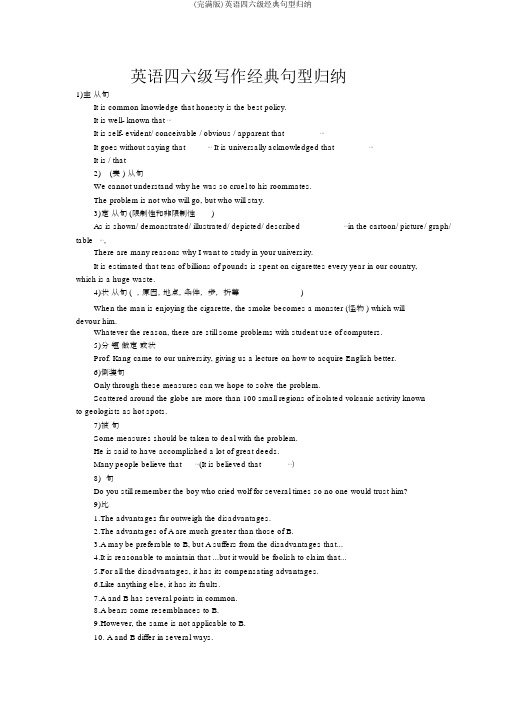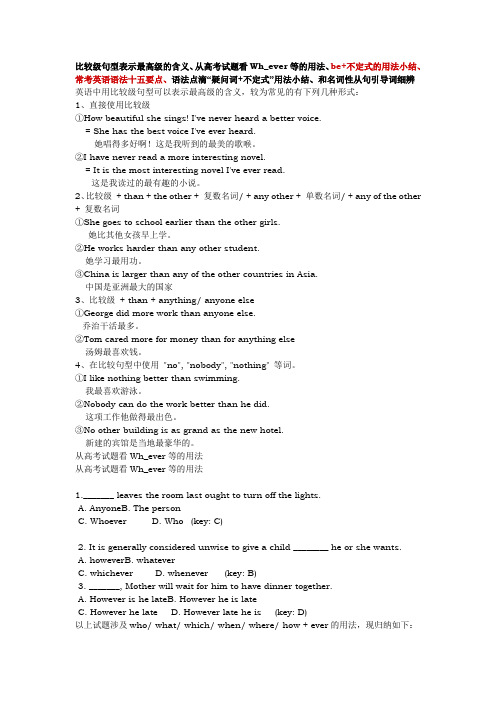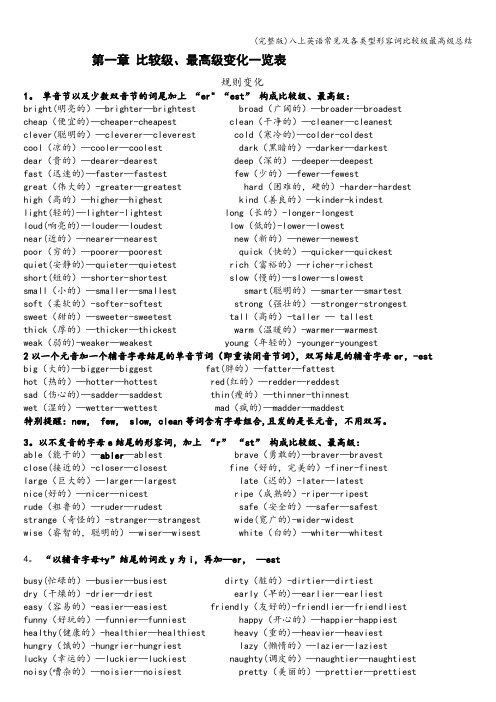(完整版)英语比较句型用法归纳
初中知识点归纳形容词和副词的比较级和最高级的特殊用法与句型转换

初中知识点归纳形容词和副词的比较级和最高级的特殊用法与句型转换形容词和副词是英语中非常重要的词类,用于描述人、事物和动作。
其中,比较级和最高级是形容词和副词常用的语法形式。
本文将对形容词和副词的比较级和最高级进行归纳总结,并介绍一些特殊用法和句型转换。
一、形容词比较级和最高级的构成规则形容词的比较级和最高级通常是在词尾加上-er和-est,但也存在一些特殊规则。
这里给出一些常见的构成规则和特殊形式:1. 单音节形容词:比较级:原级 + er最高级:原级 + est例如:- small(小) - smaller(更小) - the smallest(最小)- tall(高) - taller(更高) - the tallest(最高)2. 以辅音字母+y结尾的形容词:比较级:去y,变i + er最高级:去y,变i + est- happy(快乐) - happier(更快乐) - the happiest(最快乐)- easy(容易) - easier(更容易) - the easiest(最容易)3. 以e结尾的形容词:比较级:直接加r最高级:直接加st例如:- wide(宽) - wider(更宽) - the widest(最宽)- safe(安全) - safer(更安全) - the safest(最安全)4. 以重读闭音节结尾的形容词:比较级:双写末尾辅音字母 + er最高级:双写末尾辅音字母 + est例如:- big(大) - bigger(更大) - the biggest(最大)- hot(热) - hotter(更热) - the hottest(最热)5. 不规则形容词:有一些形容词的比较级和最高级是不规则的,需要特别记忆。
- good(好) - better(更好) - the best(最好)- bad(坏) - worse(更坏) - the worst(最坏)二、副词比较级和最高级的构成规则副词的比较级和最高级通常是在形容词的比较级和最高级前面加上more和most。
四种易混句型的用法比较

四种易混句型的用法比较崔长平河南遂平中学(463100)在高中英语复习备考中,我们常常会遇到it be … since …,it be … before …, it be … that …和this is …(that)…这四种句型,由于它们很近似,故而易混易错、难于掌握。
现将此四种句型在用法上比较如下:Ⅰ. it be … since …在英语中,有一些非延续性动词,它们在完成时态中是不能与持续性状语连用的。
这类非延续性动词常见的有:go, come, leave, arrive, return, begin, borrow, die, lose, reach, fall, discover, jump, become, join, get up 等。
既要使用非延续性动词又要使用持续性状语来表达的时候,我们经常会用到it be +表示一段时间的名词(名词词组,形容词等)+since短语或从句这一句型。
It is three days since Mr. Smith left Hong Kong.(Mr. Smith已经离开香港三天了。
)It is just a week since we arrived here.(我们到达这里刚好一周。
)It is a long time since I met you last.(从我上次见到你到现在已有好长一段时间了。
)■在这一句型中,since从句经常使用一般过去时,主句中使用一般现在时或现在完成时来表达“从过去到现在”这一完成时意义。
It is / has been a long time since we met last.How long is it since he left NewYork?How long has it been since they reached London?It has been / is over sixty years since the People′s Republic of China was established.■表达“现在完成时”意义时,偶尔也会见到主、从句中均使用现在完成时的用法。
小学英语语法句型归纳总结

小学英语语法句型归纳总结英语作为一门国际语言,学习英语语法对于小学生来说是至关重要的。
掌握英语语法句型,不仅能够帮助学生更好地理解英语的用法,还能够提高他们的英语表达能力。
下面是对小学英语语法句型的归纳总结:一、简单句型1. 主语 + 动词(及物或不及物)例如:- I eat an apple.(我吃一个苹果。
)- They run in the park.(他们在公园里跑。
)2. 主语 + 动词 + 宾语例如:- She reads a book.(她读一本书。
)- Tom throws a ball.(汤姆扔一个球。
)3. 主语 + 系动词(be动词)+ 表语例如:- I am a student.(我是一个学生。
)- The flower is beautiful.(这朵花很漂亮。
)4. 主语 + 系动词(be动词)+ 地点例如:- The book is on the table.(书在桌子上。
)- The cat is under the chair.(猫在椅子下面。
)二、疑问句1. 一般疑问句使用助动词do、does或did加在句子的主语前,然后再加上动词原形。
例如:- Do you like ice cream?(你喜欢冰淇淋吗?)- Does he play basketball?(他打篮球吗?)2. 特殊疑问句特殊疑问句是用来询问特定信息或细节的问句,通常以疑问代词开头。
例如:- What is your name?(你叫什么名字?)- When is your birthday?(你的生日是什么时候?)- Where do you live?(你住在哪里?)在句子前面加上否定词,通常为don't、doesn't或didn't。
例如:- I don't like pizza.(我不喜欢披萨。
)- He doesn't have a pet.(他没有宠物。
(完整版)英语四六级经典句型归纳

英语四六级写作经典句型归纳1)主从句It is common knowledge that honesty is the best policy.It is well- known that ⋯It is self- evident/ conceivable / obvious / apparent that⋯It goes without saying that⋯It is universally acknowledged that It is / that2) (表 )从句We cannot understand why he was so cruel to his roommates.The problem is not who will go, but who will stay.3)定从句 (限制性和非限制性)As is shown/ demonstrated/ illustrated/ depicted/ described⋯⋯in the cartoon/ picture/ graph/table⋯,There are many reasons why I want to study in your university.It is estimated that tens of billions of pounds is spent on cigarettes every year in our country, which is a huge waste.4)状从句 (,原因,地点,条件,步,折等)When the man is enjoying the cigarette, the smoke becomes a monster (怪物 ) which will devour him.Whatever the reason, there are still some problems with student use of computers.5)分短做定或状Prof. Kang came to our university, giving us a lecture on how to acquire English better.6)倒装句Only through these measures can we hope to solve the problem.Scattered around the globe are more than 100 small regions of isolated volcanic activity known to geologists as hot spots.7)被句Some measures should be taken to deal with the problem.He is said to have accomplished a lot of great deeds.Many people believe that⋯(It is believed that⋯)8)句Do you still remember the boy who cried wolf for several times so no one would trust him?9)比1.The advantages far outweigh the disadvantages.2.The advantages of A are much greater than those of B.3.A may be preferable to B, but A suffers from the disadvantages that...4.It is reasonable to maintain that ...but it would be foolish to claim that...5.For all the disadvantages, it has its compensating advantages.6.Like anything else, it has its faults.7.A and B has several points in common.8.A bears some resemblances to B.9.However, the same is not applicable to B.10. A and B differ in several ways.11.Evidently, it has both negative and positive effects.12.People used to think ..., but things are different now.13.The same is true of B.14.Wondering as A is ,it has its drawbacks.15.It is true that A ... , but the chief faults (obvious defects )are ...10)原因1.A number of factors are accountable for this situation.A number of factors might contribute to (lead to )(account for ) the phenomenon(problem).2.The answer to this problem involves many factors.3.The phenomenon mainly stems from the fact that...4.The factors that contribute to this5.The change in rgely results from the fact that...6.We may blame ...,but the real causes are...7.Part of the explanations for it is that ...8.One of the most common factors (causes ) is that ...9.Another contributing factor (cause ) is ...10.Perhaps the primary factor is that⋯11.But the fundamental cause is that ...11)果1.It may give rise to a host of problems.2.The immediate result it produces is ...3.It will exercise a profound influence upon...4.Its consequence can be so great that...12)批1)It is true that ..., but one vital point is being left out.2)There is a grain of truth in these statements, but they ignore a more important fact.3)Some people say ..., but it does not hold water.4)Many of us have been under the illusion that...5)A close examination would reveal how ridiculous the statement is.6)It makes no sense to argue for ...7)Too much stress placed on ... may lead to ...8)Such a statement mainly rests on the assumption that ...9)Contrary to what is widely accepted, I maintain that ...13)例1)A good case in point is ...2)As an illustration, we may take ...3)Such examples might be given easily.4)...is often cited as an example.14)明1)No one can deny the fact that ...2)The idea is hardly supported by facts.3)Unfortunately, none of the available data shows ...4)Recent studies indicate that ...5)There is sufficient evidence to show that ...6)According to statistics proved by ..., it can be seen that ...15)开篇1)Many nations have been faced with the problem of ...2)Recently the problem has been brought into focus.3)Recently the phenomenon has become a heated topic.4)Recently the issue has aroused great concern among ...5)Nowadays there is a growing concern over ...6)Never in our history has the idea that ... been so popular.7)Faced with ..., quite a few people argue that ...8)According to a recent survey, ...9)With the rapid development of ..., ...16)结尾1)From what has been discussed above, we can draw the conclusion that ...2)It is high time that strict measures were taken to stop ...3)It is necessary that steps should be taken to ...4)In conclusion, it is imperative that ...5)There is no easy method, but ...might be of some help.6)To solve the above-mentioned problem, we must ...7)In summary, if we continue to ignore the above-mentioned issue, more problems will crop up.8)With the efforts of all parts concerned, the problem will be solved thoroughly.9)We might do more than identify the cause ; it is important to take actions to ...10)Taking all these into account, we ...11)Whether it is good or not /positive or negative, one thing is certain/clear...英语四六级写作25 个加分句型一、 the + est + 名词+ (that) +the most + 形容词+ 名词主词+ have ever + seen (known/heard/had/read, etc)+ (that) + 主词+ have ever + seen (known/heard/had/read,etc)例句: Helen is the most beautiful girl that I have ever seen 。
高三英语比较级句型表示最高级的含义、从高考试题看Wh_ever等的用法等六篇语法用法小段文

比较级句型表示最高级的含义、从高考试题看Wh_ever等的用法、be+不定式的用法小结、常考英语语法十五要点、语法点滴“疑问词+不定式”用法小结、和名词性从句引导词细辨英语中用比较级句型可以表示最高级的含义,较为常见的有下列几种形式:1、直接使用比较级①How beautiful she sings! I've never heard a better voice.= She has the best voice I've ever heard.她唱得多好啊!这是我听到的最美的歌喉。
②I have never read a more interesting novel.= It is the most interesting novel I've ever read.这是我读过的最有趣的小说。
2、比较级+ than + the other + 复数名词/ + any other + 单数名词/ + any of the other + 复数名词①She goes to school earlier than the other girls.她比其他女孩早上学。
②He works harder than any other student.她学习最用功。
③China is larger than any of the other countries in Asia.中国是亚洲最大的国家3、比较级+ than + anything/ anyone else①George did more work than anyone else.乔治干活最多。
②Tom cared more for money than for anything else汤姆最喜欢钱。
4、在比较句型中使用"no", "nobody", "nothing" 等词。
(完整版)八上英语常见及各类型形容词比较级最高级总结

第一章比较级、最高级变化一览表规则变化1。
单音节以及少数双音节的词尾加上“er" “est”构成比较级、最高级:bright(明亮的)—brighter—brightest broad(广阔的)—broader—broadestcheap(便宜的)—cheaper-cheapest clean(干净的)—cleaner—cleanest clever(聪明的)—cleverer—cleverest cold(寒冷的)—colder-coldestcool(凉的)—cooler—coolest dark(黑暗的)—darker—darkestdear(贵的)—dearer-dearest deep(深的)—deeper—deepestfast(迅速的)—faster—fastest few(少的)—fewer—fewestgreat(伟大的)-greater—greatest hard(困难的,硬的)-harder-hardesthigh(高的)—higher—highest kind(善良的)—kinder-kindestlight(轻的)—lighter-lightest long(长的)-longer-longestloud(响亮的)—louder—loudest low(低的)-lower—lowestnear(近的)—nearer—nearest new(新的)—newer—newestpoor(穷的)—poorer—poorest quick(快的)—quicker—quickestquiet(安静的)—quieter—quietest rich(富裕的)—richer-richestshort(短的)—shorter-shortest slow(慢的)—slower—slowestsmall(小的)—smaller—smallest smart(聪明的)—smarter—smartestsoft(柔软的)-softer-softest strong(强壮的)—stronger-strongestsweet(甜的)—sweeter-sweetest tall(高的)-taller — tallest thick(厚的)—thicker—thickest warm(温暖的)-warmer—warmestweak(弱的)-weaker—weakest young(年轻的)-younger-youngest2以一个元音加一个辅音字母结尾的单音节词(即重读闭音节词),双写结尾的辅音字母er,-est big(大的)—bigger—biggest fat(胖的)—fatter—fattesthot(热的)—hotter—hottest red(红的)—redder—reddestsad(伤心的)—sadder—saddest thin(瘦的)—thinner-thinnestwet(湿的)—wetter—wettest mad(疯的)—madder—maddest特别提醒:new, few, slow, clean等词含有字母组合,且发的是长元音,不用双写。
(完整版)英语外研版八上短语句型归纳,推荐文档
八年级英语上册复习资料Module 1 How to learn English重点短语:1.practise doing sth. 练习做某事studyplan学习计划2. a number of +可数名词复数+V(复数):许多、很多the number of+可数名词复数+V(单数):……的数量3.advice建议paper纸(都是不可数名词)a piece of advice一条建议 a piece of paper 一张纸three pieces of paper 三张纸give sb. some advice给某人一些建议advise sb. to do sth. 建议某人去做某事4.write it / them down把它(它们)写下来5.What else? 还有什么其它的?6.It is adj.(形容词)+for sb. )to do sth. (对某人来说)做某事怎么样It is difficult for old people to learn English well.对于老年人来说学习英语很难。
It is adj. (形容词)+ (of sb.) to do sth.某人做某事某人怎么样It is very kind of you to help me. 你能帮我你真好。
(以上动词不定式短语在句中作真正,It 是形式主语)7.It is a good idea\way to do sth.做某事时个好主意(好方法)。
8.this term这学期last term上学期next term下学期9.help sb. (to)do sth. help sb. with sth.帮助某人做某事10.ask for advice征求意见basicquestions基本问题11.人(作主语)+spend on sth.人(作主语)+spend (in) doing sth. 某人花费时间做某事物(作主语)+cost (花某人多少钱)It takes sb. some time to do sth. 花某人多少时间去做某事人(作主语)+pay for(付钱、花钱)12.the meaning of……的意思try to do sth.尝试做某事13.talk\speak to sb.与某人谈话write tosb. 写信给某人14.start a conversation开始一段谈话15.talk about sth. with sb.跟某人谈论某事16.as much\many as possible尽可能多地Let’s speak English as much as possible.Let’s find out what else we can do tosave as many animals as possible.=Let’s find out what else we can do tosave animals as many as possible.much 修饰不可数名词many 修饰可数名词17.make mistakes \make a mistake 犯错误18.listen to the radio听收音机19.a way to do sth\ (good )ways to do sth.做某事的(好)方法20.several times 几次What’s happening?发生什么事?21.something new\old\interesting 新\旧\有趣的东西\事情形容词修饰不定代词时,放在不定代词后面。
英语比较级和最高级的用法归纳
英语⽐较级和最⾼级的⽤法归纳 在学习英语过程中,会遇到很多的语法问题,⽐如⽐较级和最⾼级的⽤法,对于这些语法你能够掌握吗?下⾯是⼩编整理的英语⽐较级和最⾼级的⽤法,欢迎阅读!英语⽐较级和最⾼级的⽤法 英语⽐较级和最⾼级的⽤法 ⼀、形容词、副词的⽐较级和最⾼级的构成规则 1.⼀般单⾳节词和少数以-er,-ow结尾的双⾳节词,⽐较级在后⾯加-er,最⾼级在后⾯加-est; (1)单⾳节词 如:small→smaller→smallest short→shorter→shortest tall→taller→tallest great→greater→greatest (2)双⾳节词 如:clever→cleverer→cleverest narrow→narrower→narrowest 2.以不发⾳e结尾的单⾳节词,⽐较在原级后加-r,最⾼级在原级后加-st; 如:large→larger→largest nice→nicer→nicest able→abler→ablest 3.在重读闭⾳节(即:辅⾳+元⾳+辅⾳)中,先双写末尾的辅⾳字母,⽐较级加-er,最⾼级加-est; 如:big→bigger→biggest hot→hotter→hottest fat→fatter→fattest 4.以“辅⾳字母+y”结尾的双⾳节词,把y改为i,⽐较级加-er,最⾼级加-est; 如:easy→easier→easiest heavy→heavier→heaviest busy→busier→busiest happy→happier→happiest 5.其他双⾳节词和多⾳节词,⽐较级在前⾯加more,最⾼级在前⾯加most; 如:beautiful→more beautiful→most beautiful different→more different→most different easily→more easily→most easily 注意:(1)形容词最⾼级前通常必须⽤定冠词 the,副词最⾼级前可不⽤。
英语比较状语从句的用法大全
外教一对一英语比较状语从句的用法大全比较状语从句比较状语从句主要用来表达人或事物的属性或特征的不同程度。
所以,比较关系都是有关形容词和副词的比较用法的。
比较状语从句分为三类:同级比较、比较级和最高级。
(一)同级比较当要表达不同的人或物在某方面是一样的时,一般采用同级比较,其基本结构为:as...as...。
其中,第一个as为副词,所以后面接的是形容词或副词;而第二个as为连词,所以后面接的是主谓结构,而且谓语动词因为跟主句的一般都是一样的,所以往往会省略掉。
如:The soldier is as brave as a lion. (这个战士象狮子一样勇猛。
)The short-distance runner wish he can run as fast as the ostrich. (这位短跑运动员真希望自己能跑得像驼鸟一样快。
)【注意】1、as...as...的否定结构为:not so/as...as...。
其中,第一个as也可以换作so。
如:The soldier is not so/as brave as a lion.The short-distance runner cannot run so/as fast as the ostrich.2、the same as也表示“与...一样”。
如:Twins look the same as each other. (双胞胎看上去长得一样。
)The imperial gallon is not the same as the US gallon. (英制的加仑和与美制的容量不同。
)3、just as表示“正如”,也有“just as..., so...”的句型用法。
如:It has turned out just as I wished. (它终于如我所愿。
)Just as you would not, so neither would they. (正如你们不愿意一样,他们也不会答应的。
英语中的比较句型
英语中的比较句型英语中表示比较的句型有很多。
下面列举几种最基本的必须掌握的比较句型。
1. 用比较级和than搭配表示比较1) 副词比较级和than 搭配表示比较He came earlier than Peter. 他比彼得早到。
Light travels faster than sound. 光比声音传播得快。
2) 形容词比较级和than搭配表示比较He is taller than her younger brother. 他比他弟弟高。
Europe has less land than Canada. 欧洲的面积比加拿大小。
Mary is more beautiful than anyone else in her company. 玛丽在公司里比其他人都漂亮。
3) 形容词或副词比较级前可以有修饰语a) 比较级前也可加 any, no, some, even, still 等词作修饰语。
Peter is no cleverer than her sister. 彼得没有他姐姐聪明。
Is your father any better at all? 你父亲有些好转吗?Sally drives fast, but Olive drives even faster. 萨莉开车开得很快, 奥利夫开得更快。
b) 比较级前可加much, a lot, far, a bit, a little, slightly 等表示程度的词。
Life was much harder than it is today. 那时的生活比现在苦得多。
These tomatoes are a little cheaper than those.这些西红柿比那些稍便宜点。
He ran much faster than Peter. 他比彼得跑得快很多。
c) 数量词也可作比较级的修饰语My brother is three years older than I.我哥比我大三岁。
- 1、下载文档前请自行甄别文档内容的完整性,平台不提供额外的编辑、内容补充、找答案等附加服务。
- 2、"仅部分预览"的文档,不可在线预览部分如存在完整性等问题,可反馈申请退款(可完整预览的文档不适用该条件!)。
- 3、如文档侵犯您的权益,请联系客服反馈,我们会尽快为您处理(人工客服工作时间:9:00-18:30)。
英语比较句型用法归纳
巩勃
(1)原级比较:
例:English is not so difficult a subject as Russia.
英语不是和像俄语一样难的科目。
Their bones are not as thick as adults’.
他们的骨头和成年人的不一样厚。
(2)一方超过另一方:
例:The weather of this year is a lot hotter than that of last year.
今年的气候比上一年的气候要热得多。
(3)一方不如另一方:
例:The restoration was so bad that it made some of the buildings less secure than they had been before.
修复工作是如此的糟,以致于它使得一些建筑没有以前安全了。
(4) The + ~er + S + V, ~~~ the + ~er + S + V ~~~
The + more + adj + S + V, ~~~ the + more + adj + S + V ~~~ (愈...愈...)
例:The harder you work, the more progress you make.
你愈努力,你愈进步。
The more books we read, the more learned we become.
我们书读愈多,我们愈有学问。
(5) more…. than…与其说…倒不如说
例:Smith is more diligent than intelligent.
与其说Smith聪明倒不如说他勤奋。
(6) no +形容词比较级+ than = as +形容词的反义词+ as
例:I am no better at English than you. 我的英语不比你好。
(7) that 在前后比较中代替不可数名词和特指的单数可数名词
例:The traditional picture of St Nicholas is quite different from that of Father Christmas.
(8) one 在前后比较中代替泛指的单数可数名词。
例:I prefer a flat in Beijing to one in Nanjing, because I want to live near my Mom's. 与南京相比我更喜欢在北京有一套公寓,因为我想跟我妈妈住一起。
(9) those 在前后比较中代替特指的复数可数名词。
例:Salaries are higher here than those in my country.
这儿的工资比我们国家的高。
(10) ones 在前后比较中代替泛指的复数可数名词
例:Cars do cause us some health problems --- in fact far more serious ones than mobile phones do.汽车确实给我们的身体健康带来问题,事实上比手机造成的问题更严重。
特殊的比较句型:
(1) A differs from B in that…(A不同于B在于……)
例:She differs from her sister in the color of her eyes.
她眼睛的颜色跟她姐姐不同。
(2) ...varies from person to person(……是因人而异的)
例:The opinion of the problem varies from person to person.
对这个问题的看法是因人而异的。
(3) A is superior(inferior) to B. A 优越于B
例:The modal is technically superior to its competitors.
这一款式在技术上优越于与之竞争的产品。
Some consider digital TV to be superior to satellite TV.
(4) be different from
例:Its meaning can be completely different from the meaning of its components. 它的意思有时候跟它的合成的意思完全不一样。
(5) be inferior to
例:Modern music is often considered inferior to that of the past.
现代音乐常被人认为不如过去的。
(6) A and B have sth in common. A 和B 有共同点。
例:The Japanese and Chinese cultures have a lot in common.
日本与中国的文化具有许多相同点。
